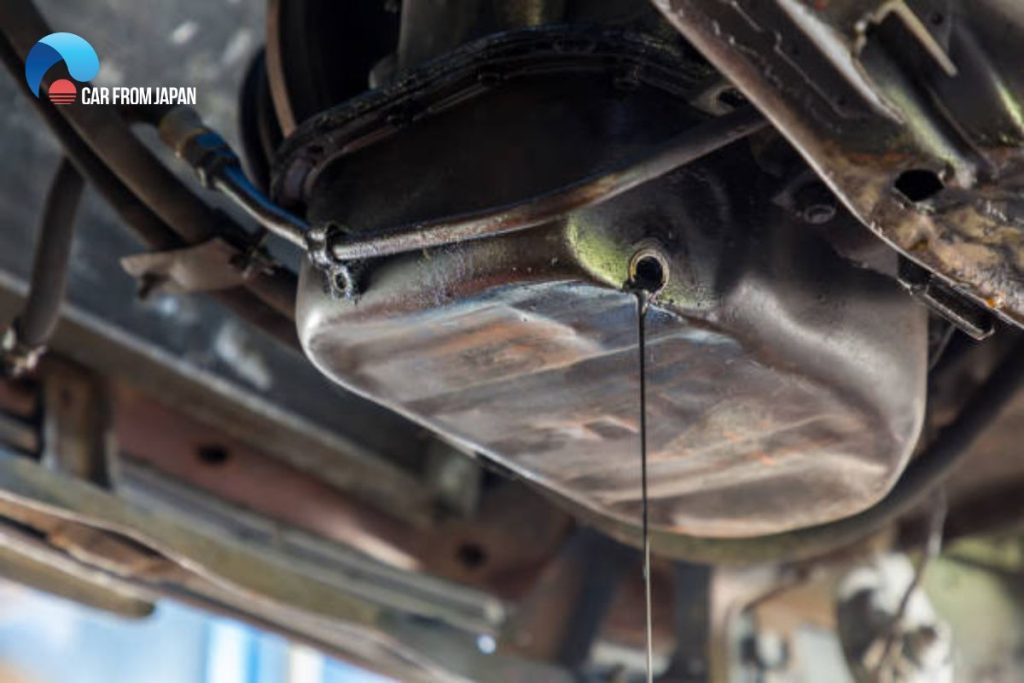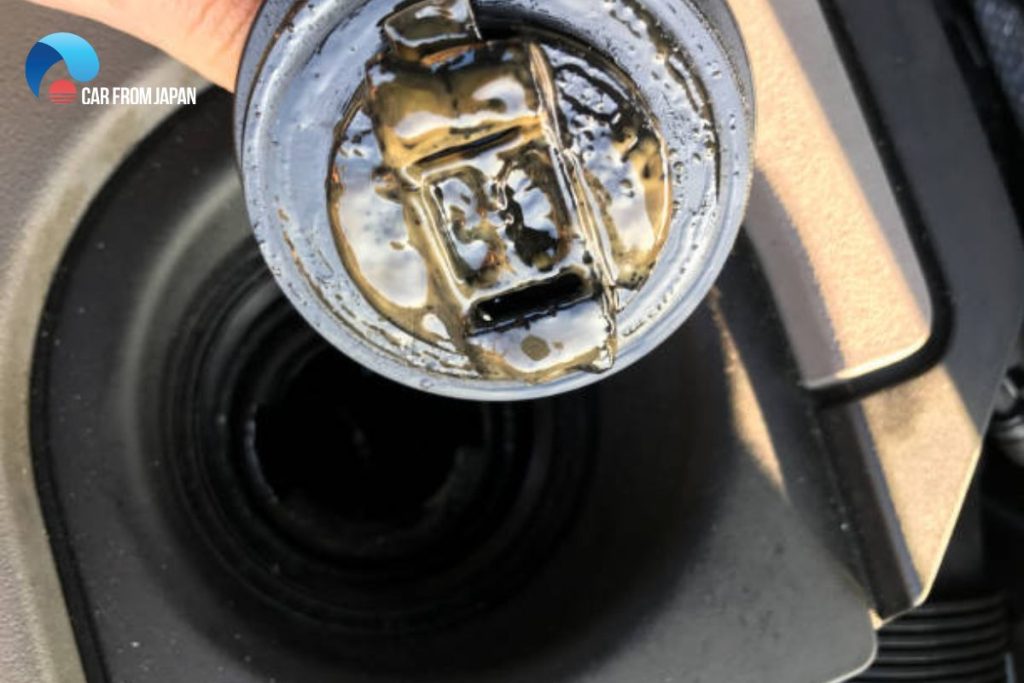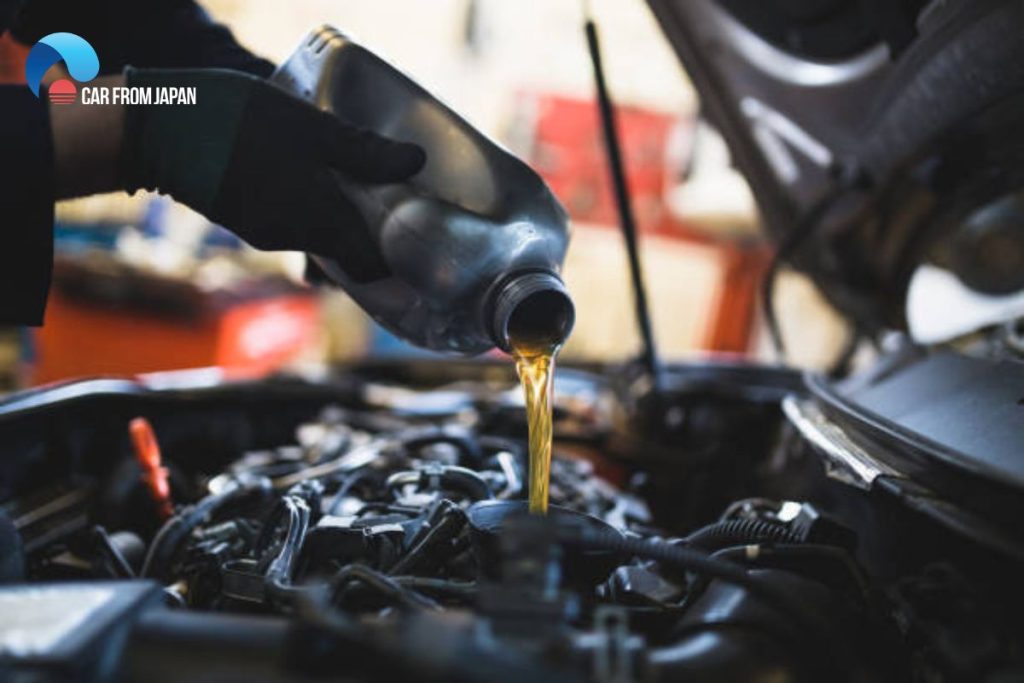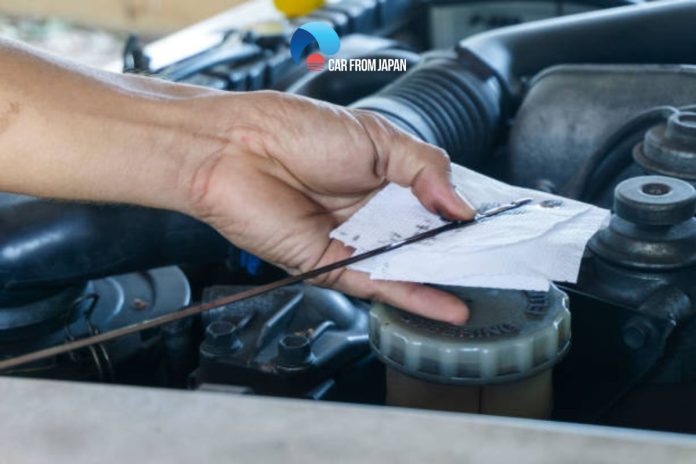You check your oil regularly, and lately, you’ve noticed it’s disappearing faster than usual. But there’s no puddle under your car, and you don’t see any smoke coming from the exhaust. What could be causing this mysterious oil loss? Don’t worry, there are a few common culprits of the car losing oil but no leak or smoke, and we’ll explore them in detail:
Contents
Car Losing Oil But No Leak Or Smoke: Symptoms You Shouldn’t Ignore
The oil consumption depends on many factors: engine type, operating conditions, maintenance history… However, if the car owner notices an unusually high oil consumption, it is necessary to check to find the cause promptly. Most of us are advised that if we notice the following unusual signs, it is highly likely that the vehicle is losing oil:
- Leaking oil under the chassis: Over time, the seals will function less well, and the oil will easily spill out.
- Blue smoke from the exhaust pipe: Oil leaks inside the combustion chamber. It greatly affects the combustion efficiency of the ignition and fuel mixture inside the combustion, and you will see the blue smoke coming from the exhaust system.
However, it will be a big concern. If your car is losing oil, but there are no visible leaks or smoke, in this case, how do we know the car is losing oil? Here are five symptoms you shouldn’t ignore in such a situation:

- Engine performance issues
If you experience a noticeable decrease in engine performance, such as reduced power, rough idling, or misfiring, it could be related to oil loss. Insufficient lubrication due to oil loss can cause increased friction and wear on engine parts, leading to performance problems.
- Check engine light
If your car is losing oil but there are no visible leaks, and the check engine light is illuminated, it can be an additional symptom that shouldn’t be ignored. The check engine light will turn on when it detects a potential issue with the engine or emissions system.
- Strange noise from the engine
Unusual engine noises, such as knocking, ticking, or grinding sounds, can be a red flag for internal engine damage. Insufficient lubrication due to oil loss can cause increased friction between moving parts, leading to these abnormal noises.
- Oil pressure warning light
You also know that the oil pressure warning light indicates a potential problem with the oil pressure in the engine. When you see this warning light on your car dashboard, it’s a sign that the engine oil is leaking. The oil pressure warning light can come on if the oil level in the engine is too low. Insufficient oil can lead to a drop in oil pressure, causing the warning light to activate.
- Gradual oil consumption
If you notice that your car’s oil level is consistently dropping over time, even though you haven’t detected any leaks or excessive exhaust smoke, it could indicate an internal issue. Internal engine components, such as piston rings or valve seals, may be worn or damaged, leading to oil consumption.
These symptoms can help you diagnose the issue quickly if you are experiencing oil loss without any visible leaks or smoke, to have suitable methods to handle it timely. In the next part, we will find the culprits behind this problem:
What’s Going On If My Car Is Losing Oil But No Leak Or Smoke?
Why did your oil disappear without a leak or smoke? It’s absolutely a puzzle question. Don’t worry! Here are a few possible reasons for oil loss without any apparent signs:
Evaporative oil
In some cases, oil can evaporate due to high engine temperatures. This can occur if the engine is running excessively hot or if there is an issue with the PCV (Positive Crankcase Ventilation) system, which helps control the buildup of pressure and vapors in the engine crankcase. The evaporative loss might not leave any obvious signs of oil leakage.
Damaged oil gasket

It is possible that there is a failure in an oil seal or gasket within the engine. These seals and gaskets are designed to keep oil contained within specific areas of the engine. If they fail, oil can leak internally, such as into the coolant passages or into the intake or exhaust manifold, and at that time, you could not detect any obvious symptoms.
Inaccurate oil measurement
It’s important to ensure that the oil loss is not a result of inaccurate oil measurements or faulty oil level sensors. Checking the oil level using the dipstick and confirming its accuracy can help rule out measurement errors.
Internal engine consumption
The oil might be getting consumed internally within the engine. Worn or damaged internal engine components, such as piston rings or valve seals, can allow oil to pass into the combustion chamber and be burned off during the combustion process. This can result in oil loss without any external signs.
Overloaded vehicle
When your car is overloaded, it will create high pressure, forcing the engine to operate at high capacity. This causes an increase in compression and combustion pressure inside the engine block, leading to increased temperatures of the cylinder and piston. The consequence of this situation is that car oil evaporates quickly while increasing oil consumption.
Using engine braking
When the driver suddenly uses engine braking, the vacuum pressure will increase rapidly. The amount of oil passed into the combustion chamber will be more. With cars with turbochargers, the oil will encounter high heat when the car is operating, or evaporate faster.
How To Stop Engine From Burning Oil?
For a car to operate smoothly, it is completely normal for the engine to consume oil. And for a car having a high mileage, the amount of oil consumed will be higher than new vehicles. However, for some reason, the car can lose more oil than usual. This is a sign that the car engine is having problems or subjective reasons from the vehicle user.
When the vehicle consumes too much oil, it will seriously affect the engine’s ability to operate: it increases piston friction, causes wear, bad engine performance, and overheating… So, how can you prevent this issue?
Check and change the oil regularly
Checking the oil level is essential. Besides, periodically changing new oil is also quite important. Car manufacturers always recommend that you regularly check the oil level in your car to prevent your car from running out of engine oil.

Changing oil periodically is also recommended to be done regularly so that parts are always lubricated during operation and not corrosive. Replacing oil also helps clean the dirt inside the engine, helping the mechanical system become cleaner and operate more smoothly.
In addition, drivers can use an oil dipstick to check the car’s oil condition. If you see the amount of oil decreasing rapidly in a short period of time, the fastest way to check your car’s oil is to bring your car to a maintenance center for inspection.
Address engine issues
If the oil consumption persists despite the above measures, it is recommended to have your vehicle inspected by a qualified mechanic. Internal engine problems, such as worn piston rings or valve seals, may require repairs or replacements. The mechanic can diagnose the root cause of the oil consumption and provide appropriate solutions.
Use the right grade of oil
Make sure you are using the correct grade and viscosity of oil as specified by the manufacturer for your engine. Using the wrong type of oil can contribute to increased oil consumption. Consult your vehicle’s owner’s manual or consult with a qualified mechanic to determine the appropriate oil grade.
It’s important to note that excessive oil consumption can be a symptom of underlying engine problems. So you should seek professional advice to have an accurate diagnosis.
FAQs
If your car has no oil will it start?
If your car has no oil or an extremely low oil level, it is not advisable to start the engine. Operating the engine without sufficient oil can cause severe damage and potentially lead to engine failure. If you suspect that your car has no oil or a critically low oil level, it is crucial to address the situation before attempting to start the engine. Remember, running the engine with no or extremely low oil can cause irreversible damage. It’s always better to err on the side of caution and have the issue addressed by a professional before attempting to start the engine.
How long can I run my car with too much oil?
Our answer is If the oil is overfilled, your car just drives for about 1000 miles or a week. If you have only slightly overfilled the oil, you may choose to monitor the situation closely and have it corrected at your next scheduled oil change. However, it is generally advisable to address the overfilled condition as soon as possible to avoid potential engine damage.
How much does it cost to fix the oil leak?
Fixing a car oil leak costs about $600 to $1,000. The cost to repair an oil leak can vary significantly depending on several factors, including the cause of the leak, the location of the leak, the extent of the damage, and the make and model of your vehicle. Additionally, labor rates and parts costs can vary depending on your location and the specific repair facility you choose. Therefore, it is challenging to provide an exact cost without more specific information.
Wrapping Up
If your car is mysteriously losing oil without any visible leaks or smoke, don’t ignore the problem. It could be a sign of worn piston rings, valve stem seals, or a faulty PCV valve. Addressing these issues promptly can prevent further engine damage and costly repairs down the road. Remember, regular maintenance and paying attention to your car’s warning signs are key to keeping it running smoothly for years to come.



